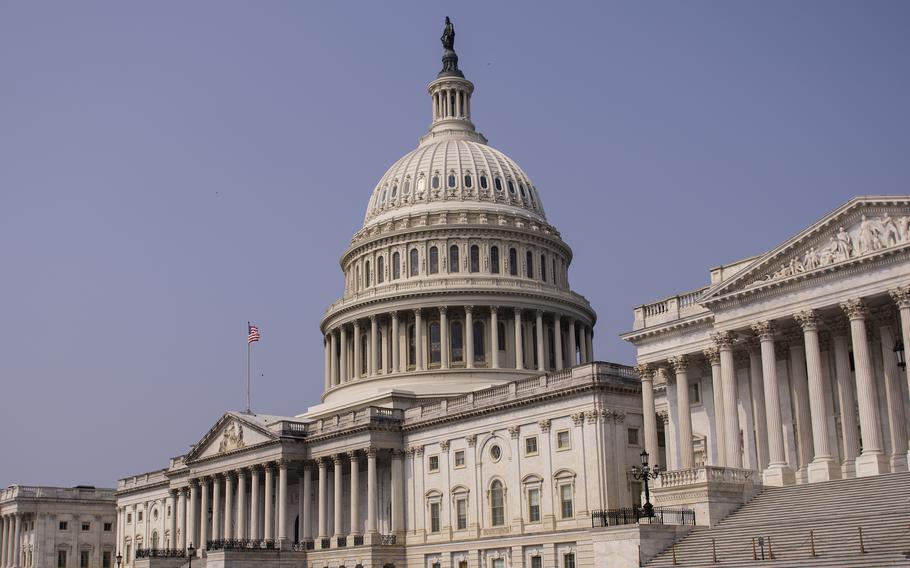
The U.S. Capitol building is seen on June 30, 2023, in Washington, D.C. (Carlos Bongioanni/Stars and Stripes)
WASHINGTON — The Senate passed a long-delayed, full-year spending bill for the Department of Veterans Affairs on Friday that strengthens gun rights for certain veterans and averts a partial government shutdown.
Senators voted 75-22 to support the legislation, which is part of a $460 billion spending package that funds VA programs and military construction as well as five other government agencies through the end of the fiscal year on Sept. 30.
A partial government shutdown was set to take effect at midnight if Congress failed to pass the measure. The Republican-led House approved the package on Wednesday.
“To folks who worry that divided government means nothing ever gets done, this bipartisan package says otherwise: it helps parents and veterans and firefighters and farmers and school cafeterias and more,” said Senate Majority Leader Chuck Schumer, D-N.Y.
The VA bill was fought over for months as the House and Senate clashed over divisive conservative policies and cuts the House had inserted into its version of the legislation last year.
Most of the controversial riders, such as prohibitions on abortions for veterans and gender-affirming care for transgender veterans, were stripped from the final bill. But a gun rights provision championed by Republicans, as well as some moderate Democrats in the Senate, stayed.
The measure would stop the VA from reporting to a federal gun background check system when veterans are found mentally incapable of managing their financial affairs. Opponents of the decades-old policy argued it infringed on veterans’ rights to firearms and relied on an overly broad definition of incompetence.
The VA will now have to seek a court order declaring a veteran is a danger to themselves or others before they are reported to the system and blocked from firearm purchases.
“This is a win for Second Amendment rights and for veterans who have made it clear that VA’s current practice is pushing some folks away from accessing the mental health care they need out of fear their firearms will be seized,” said Sen. Jon Tester, D-Mont., chairman of the Senate Veterans’ Affairs Committee.
Other Democrats strongly objected to the measure, fearing it will exacerbate veteran suicides and give veterans suffering from serious mental health conditions such as schizophrenia and dementia access to guns. Firearms are used in about 70% of veteran suicides, according to VA data.
Sen. Chris Murphy, D-Conn., said he would vote against the entire VA spending bill due to the “terrible” gun policy rider.
“I can’t sugarcoat this: this provision, which could result in 20,000 new seriously mentally ill individuals being able to buy guns each year, will be a death sentence for many,” he wrote on X, formerly Twitter.
The White House also voiced its opposition and said it “remains committed to exploring every possible pathway to keep guns out of the hands of those who shouldn’t have them.”
About 65,000 veterans have assigned fiduciaries to manage their finances and VA benefits. In early 2023, the VA was responsible for 97.9% of the names submitted to the gun background check system for mental incompetency, according to the Congressional Research Service.
The funding bill for the VA includes $16.2 billion for mental health programs — a $2.3 billion increase from fiscal 2023. Nearly $560 million of that will go toward suicide prevention outreach efforts.
About $120 billion will be spent on providing medical care for the nation’s 9.1 million veterans. That sum is in addition to the $20 billion allocated to the VA’s Toxic Exposures Fund, which covers health care costs for veterans exposed to burn pits and other toxins during service.
More than $3 billion is dedicated to combating homelessness among veterans. The number of veterans who were homeless grew by 7.4% from 2022 to 2023, climbing to more than 35,500 veterans during the most recent count.
The adopted legislation is also a vehicle for funding updates to critical military infrastructure. The bill provides nearly $19 billion for about 300 construction and family housing projects, which is $2 billion more than requested by the White House.
The construction list includes the design and construction of more than a dozen barracks, the building of six new child development centers and upgrades to five privatized housing projects and six government-owned family housing projects.
Congress has yet to pass a 2024 appropriations bill for the Defense Department, whose funding is set to expire on March 22. The Pentagon, VA and other agencies have been operating on a series of short-term funding bills since the fiscal year began Oct. 1, repeatedly bringing the government to the edge of shutdown.
The White House is expected to release its fiscal 2025 budget request for defense and the rest of the federal government on Monday while lawmakers continue negotiations over the remainder of the fiscal 2024 budget.